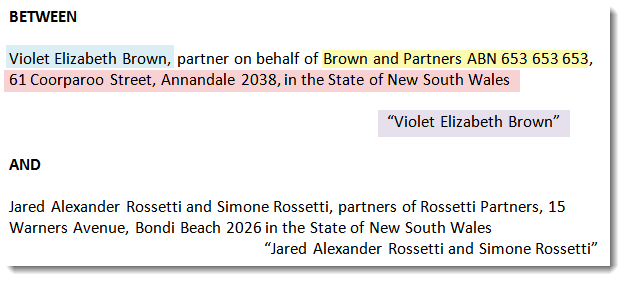It might seem very basic, but it is vital to record the names of the “parties” correctly when drafting a legal document.
Even though you might not normally address someone quite so formally in conversation or a letter you should still use their full name rather than a shortened version. For example, use “Dr. Robert S. Johnson.” rather than “Bob Johnson”
Putting an agreement in writing allows you to clarify the terms of your arrangement. Stating the parties formally and accurately gives you certainty that there can be NO question about the parties’ intentions later, especially if the particulars are changed or forgotten.
Take the time to properly identify the individual parties by the location of their current residence. For example: Instead of completing the form as “Dr. Robert S. Johnson” state that the party is “Dr. Robert S. Johnson, with a current business address at Suite 4c 101 Brooke Lane, Medicalville Queensland 4000.”
After stating the full legal name and address of each party, you can nominate a shortened name that you will use to refer to each party throughout the remainder of the Agreement. Doing so will save you from needing to repeat the full name of the parties each time you refer to them.
For example, you can nominate first name of each party, such as “Violet” and “Jared”, or a generic term such as “tenant”, and “landlord”. It is up to you, but make sure you are consistent throughout the Agreement.
Insert the shortened name after the full name and address has been stated, in inverted comma’s, such as “the Lender”, or “Jared”, to indicate that throughout the rest of the Agreement the party will be referred to as this name.
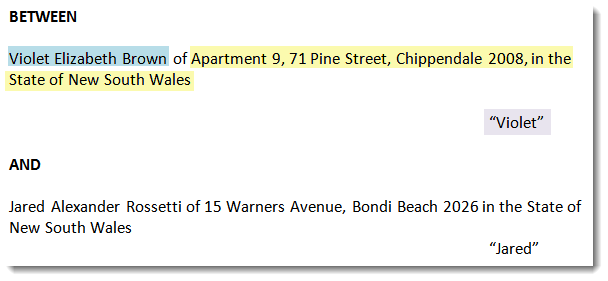
Companies (Corporations)
A company is a legal entity, capable of entering into contracts.
When dealing with a company, proprietary limited company, or partnership, always request an official authentic copy of the entity’s articles of association or partnership agreement, respectively, to make sure you have the name correctly.
In some states or territories of the Commonwealth, there may be hundreds of thousands of registered business entities. It could be in New South Wales, Victoria, Queensland, etc, and the subtle differences in a business name can mean that you have made a legal arrangement that may be hard to legally enforce against the entity you thought you were actually dealing with.
For example: you might have prepared a legal contract for a specific business service on behalf of your customer – AAA Pool Supplies. You may think that the correct company name is AAA Pool Supplies Pty Ltd., but the actual name on file with Corporate Affairs may be Triple A Pool Supplies Pty Ltd.
Although this may not seem like a huge difference to you (at the time) a court may have second thoughts about awarding you damages if say your customer fails to pay as expected. A customer who doesn’t want to pay you under the terms of a contract may also be ready to say: “mate, that contract was not with my company and so I don’t owe you anything.”
Another important issue to consider when drafting an agreement for a business entity is correctly identifying the state or territory of lodgement after the name. For example, use “AAA Pool Supplies Pty Ltd., a Queensland Gold Coast Pty Ltd company” or AAA Pool Supplies Pty Ltd., a Queensland company, with its offices located at 0000 Main Street, Mermaid Beach Gold Coast 4217.”
Always remember that the
better you specify the company in the “identification of the parties” the greater the chance of eliminating any misunderstandings down the track.
State the full company name, including the ACN and registered address of the company. For example:-
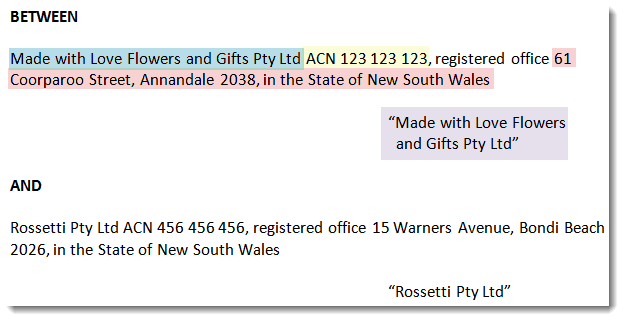
Trusts with an individual or a corporate trustee
The trustee of a trust enters into legally binding arrangements on behalf of the trust. This is because a trust is not a legal entity capable of entering into a contract. State the trustee who will be entering into the contract on behalf of the trust. A trustee can be an individual (Violet Elizabeth Brown) or a company (Rosetti Pty Ltd). For example:-
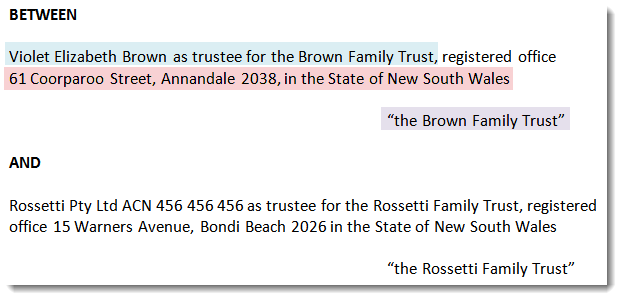
Registered business name / trading name
A registered business name (or a trading name) is not a legal entity capable of entering into a contract. You will need to list the owner of the business name, or trading name, as the person who is making the agreement. The trading or business name and registered Australian Business Number (if applicable) should follow. For example:-
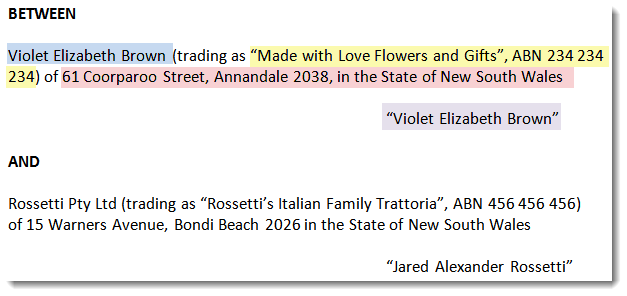
Partnerships
A partnership is not a legal entity with the power to enter into contracts – rather, a partnership is a business arrangement between two or more individuals. Individual partner/s will need to contract to bind the partnership as a whole.
Refer to the terms of the relevant Partnership Agreement to determine whether one partner has the authority to enter into the contract to bind the partnership, or whether two or more (or all) of the partners are required to enter into the contract. Include registration details if applicable. For example:-
